|
|
|
Sort Order |
|
|
|
Items / Page
|
|
|
|
|
|
|
| Srl | Item |
| 1 |
ID:
100662
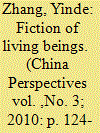

|
|
|
| 2 |
ID:
108829
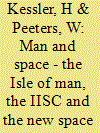

|
|
|
|
|
| Publication |
2011.
|
| Summary/Abstract |
With the arrival of private entrepreneurs and the appearance of such things as prizes to stimulate space initiatives, the space economy is changing rapidly from its initial government-driven character. A number of countries and territories, such as the Isle of Man, have understood the growing role of this new space economy and are preparing the appropriate boundary conditions to support its further development. This article shows why the Isle of Man may be uniquely placed to take advantage of recent developments in the space economy, thanks to its business-friendly tax and regulatory regime, and discusses the island's strategy to attract space businesses. The establishment of the International Institute of Space Commerce, a recently formed think-tank, is an integral part of this strategy.
|
|
|
|
|
|
|
|
|
|
|
|
|
|
|
|
| 3 |
ID:
030947
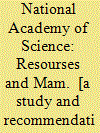

|
|
|
|
|
| Publication |
San Francisco, W H Freeman and Company, 1969.
|
| Description |
xi, 259p
|
|
|
|
|
|
|
|
|
|
|
|
Copies: C:1/I:0,R:0,Q:0
Circulation
| Accession# | Call# | Current Location | Status | Policy | Location |
| 008262 | 333.70973/NAT 008262 | Main | On Shelf | General | |
|
|
|
|
| 4 |
ID:
137894
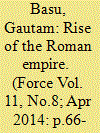

|
|
|
|
|
| Summary/Abstract |
Rome’s history spans 2,500 years which saw its transformation from a small village to the centre of a vast empire that witnessed the founding of Catholicism and left an indelible impact on every aspect of civilisation including, of course, military. Just as the influence of Ancient Rome’s culture, architecture, art and language on human history can never be overstated, so also the lasting impact of its episodic wars on the political map of Europe for centuries. Rome maintained the western World’s first professionally trained permanent army of career soldiers who were equipped, paid and even pensioned by the state, a far cry from the farmer-soldiers of Ancient Greece or the part-time citizen-soldiers of Athens. Ancient Rome was one of the largest and grandest military empires ever.
|
|
|
|
|
|
|
|
|
|
|
|
|
|
|
|
| 5 |
ID:
092036
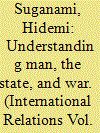

|
|
|
|
|
| Publication |
2009.
|
| Summary/Abstract |
This article expounds and assesses the key contentions of Man, the State, and War. It notes that the book contains meta-theoretical and theoretical components. Through a close re-examination of the text, the article shows how Waltz arrives at his third-image conclusion, reveals a number of errors of a conceptual or logical nature in the meta-theoretical moves that lead him to this conclusion, and explains how such errors are partly rooted in a deeper issue that the book addresses - how to integrate the three images (or three contending estimates of the major cause of war) into one overarching image of world politics based on the agent/structure dichotomy and the distinction between macro and micro enquiries. The article goes on to outline Waltz's substantive theory of international politics, found in an embryonic form in Man, the State, and War, speculates on the sources of the book's success, and assesses its main significance.
|
|
|
|
|
|
|
|
|
|
|
|
|
|
|
|
| 6 |
ID:
092043
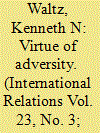

|
|
|
|
|
| Publication |
2009.
|
| Summary/Abstract |
This article is a personal account of how the author came to write his two best-known books, Man, the State, and War and Theory of International Politics. He explains the context of his early career, his army service, and some key academic influences. The article then discusses the origins of his two other major works, on foreign policy and democratic politics and on the implications of the spread of nuclear weapons. In commenting on the course of his long writing and teaching career, Professor Waltz highlights the critical importance and influence of his wife, Helen Waltz.
|
|
|
|
|
|
|
|
|
|
|
|
|
|
|
|
| 7 |
ID:
090150
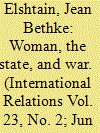

|
|
|
|
|
| Publication |
2009.
|
| Summary/Abstract |
Does `gender' as a category of analysis or as a central feature of a logic of explanation alter in significant ways Kenneth Waltz's famous `levels of analysis' as developed in his classic, Man, the State, and War? One overriding claim of feminist international relations has been that `gender' alters all levels of analysis; thus, changing `man' to `woman' in the formulation `man, the state, and war' significantly transforms our understanding of international relations. I evaluate this claim critically by assessing the adequacy of feminist formulations on each of Waltz's levels of analysis and, further, by unpacking Waltz's own understanding of these levels. I conclude that Waltz remains enormously helpful in deconstructing reductionist accounts, especially on the `first level' of analysis, but that his own account is problematic insofar as it insists on a `structural analysis' sundered from his levels 1 and 2, namely, wars flow from human nature or, alternatively, from the domestic ordering of states. I point out that Waltz himself leaves some `wiggle room' in his book that permits one to `plug in' features of the first two levels of analysis that are critical to understanding the structural level. In other words, all three levels must be in play if one is to craft a compelling explanatory framework.
|
|
|
|
|
|
|
|
|
|
|
|
|
|
|
|
|
|
|
|
|